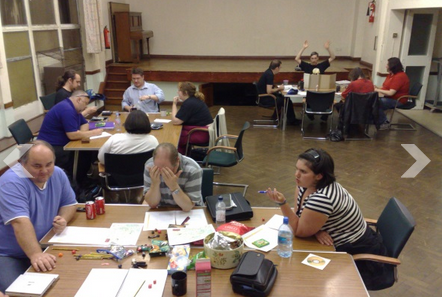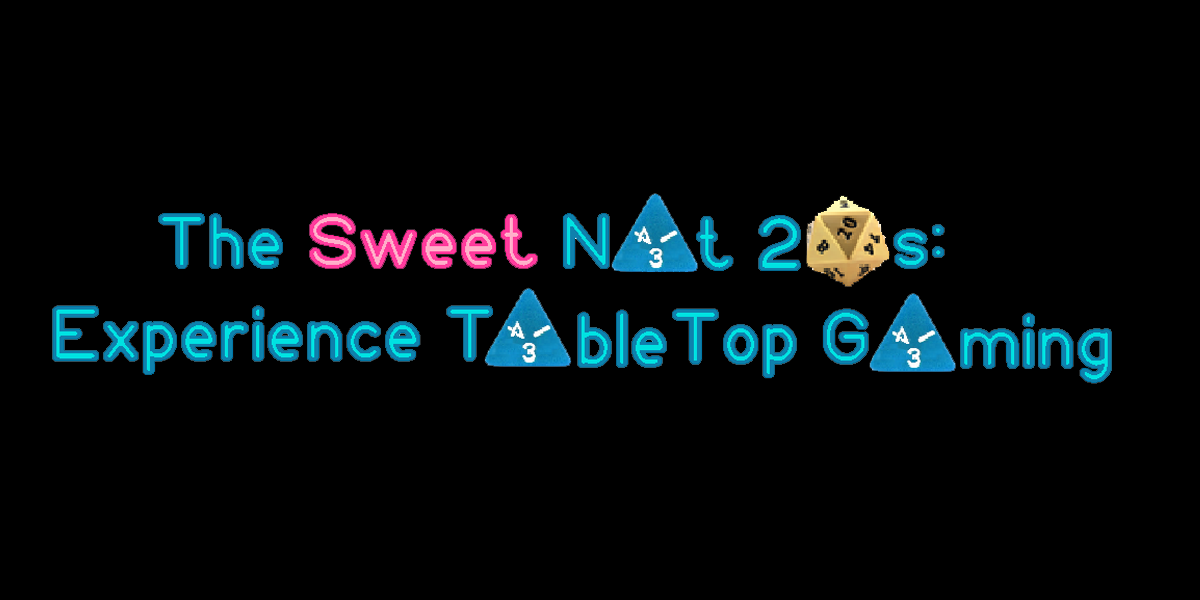“I tabletop on Fridays” is a sentence that throws a lot of people off when I speak about what I do most Friday nights. Their response is “You what?” Yeah, I’m one of those.
No, I don’t wear thick glasses, live in a basement, and have a wall full of gaming rule books. However, I do love a good campaign; but I digress. Let’s rewind. Your first question (like my co workers) is “What is tabletop(ing)?”

How It Works
Well, this is the part where I take a deep breath and explain it the way that I know how, and this is how it goes. In a video game it’s the programming that dictates whatever your character does succeeds or fails. Well, instead of a program running those calculations it’s you, paper, pencil, dice, and your DM (Dungeon Master) deciding those successes and failures.
Most of the time it goes above their heads and I also add in that it’s like being part of a story that has no set end, no script. You basically improv a character with paper, pencil, and dice. Then their response is “OOooh… (pauses) and you enjoy that?” “Yes, I do.” I’ve been going to the same table top group since September 2006, and I guess that’s one of the reasons why I am writing this article — it’s my nine year anniversary with them and also because this form of gaming is seriously old school and should never die out!
The biggest thing about this genre of gaming is that the game relies heavily on people’s ability to imagine, plus a very strong DM and storyline/plot. In most campaigns, there are some boring bits, but for the most part, it can be very exciting and enjoyable. I can say from experience, that before my club I didn’t know what die were and I was rather daunted in actually portraying someone else, but the thing is, when it’s you building this character (their stats, how they look, and their background), it becomes easier and more comfortable.
Most table top gaming rely on the use of dice (or die for plural). Normally, a table top gamer has many die sets. Most consist of a D4 (a dice that is shaped like a pyramid and has the numbers one through four on it), a D6 (six sided dice that we all know from childhood board games), D8 (a diamond shaped dice with the numbers one through eight on them), D10 (another diamond shaped dice but with the numbers one through ten on them), a diamond shaped dice used for percentages (00 to 90), D12 (a hexagonal shaped dice with the numbers one through twelve on it), and a D20 (a hexagon shaped dice with the numbers one through twenty on it). There are other dice that table top gamers may have such as a D30 (a dice with one through thirty), it looks like a ball with many numbers on it, and some would have a D100 that again look like a massive ball with many numbers on it. Then, there are the odd die such as crystal shaped ones, digital ones, and even die within die.
So Many Table Top Gaming Genres
There are so many genres and systems of table top gaming; some people even make up their own worlds and systems! The main one that everyone knows is Dungeons & Dragons, but the other mainstream ones are like Call of Cthulhu, all the White Wolf stuff (Vampire: The Masquerade, Mage: The Ascension, Werewolf: The Apocalypse, Hunter: The Reckoning), Shadowrun, Pathfinder, and so on. There’s even ones based off of television series’ such as Stargate, Supernatural, Buffy The Vampire Slayer/Angel, and comics such as X-Men, Teenage Mutant Ninja Turtles, Street Fighter, and so on. There’s even one where a lot of people need to think about and it’s called Paranoia; where everyone is a betrayer!

I feel like the ones that are my favorite have to be Call of Cthulhu, X-Men, Shadowrun, and Pathfinder. If you don’t know Call of Cthulhu, it’s based off of H.P. Lovecraft. Ever seen Hellboy? Well, the part where something is bursting out of the priest? That was literally Cthulhu. The genre itself is more like Cloverfield or Skyline – you know that the enemy is so much more stronger than you, you are extremely frail compared to them, and that defeating them is not an option, but getting away and surviving gives more promise. Plus, throughout the campaign you will lose some of your sanity (if not all of it) because the more you truly see things as they are, the less likely people will believe you and therefore driving you insane. X-Men because why wouldn’t you want to have powers? Shadowrun because it reminds me of a post apocalyptic world where cyber-ware is part of everyday life whether its liked or not, and Pathfinder because everyone needs a bit of fantasy in their lives.
I’ve had so many great memories of table top gaming like dragging my feet about helping a guy’s character because his character was really annoying or my husband failing his dice roll, which meant his character (who looked like a bipedal Aslan) tripped and fell face first on a broken slab of stone, or my character with super sonic speed body checking enemies into submission. I’ll be honest, my absolute favorite memory in a campaign was when we made camp in the desert for the night, it was lightning and my barbarian in the party felt like he was being watched so he peered out of his tent and saw multiple pairs of eyes on him. Naturally, with him being a barbarian, he charges out of the tent and lets out a war cry in his successful kill! I step out and see him holding a [dead] black sheep over his head, claiming he’d slain a beast. With a Garfield look on my face I explain to him that it was a harmless animal. He said he didn’t care, he was just happy he killed something. Luckily, he didn’t continue slaying the rest of the helpless and adorable black sheep. Yes, literally they were black and they were sheep. I totally just realized that sounded like Thor! Ha!
Unfortunately, I don’t have many good memories when I play video games. Why? Because table top gaming (for me) means I use my imagination rather than something physically being shown to me.
I’ve made some really good friends in our group, made some wonderful memories, and I definitely recommend people trying table top gaming for themselves. You won’t understand the laughter of joy in rolling a nat 20 (a natural 20 means you’ve rolled a d20 and got a 20; the highest and best roll ever) or the laughter of a failed roll also known as a nat 1 (a natural 1 meaning you’ve done the complete opposite of a nat 20 and you can’t do anything other than laugh at your bad luck!).
So go on, buy your first set of die, find a club (or grab some friends), a gaming system, a plot (most system books have plots in the back of the book), and get to rolling some sweet, oh so sweet nat 20s!

